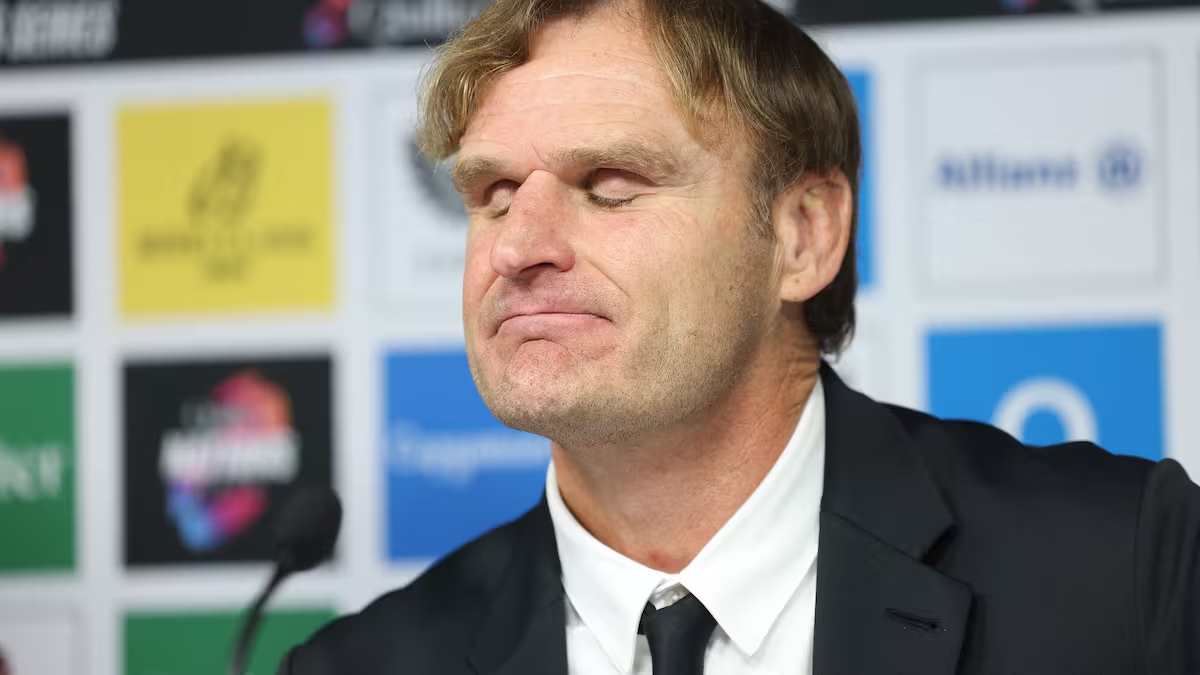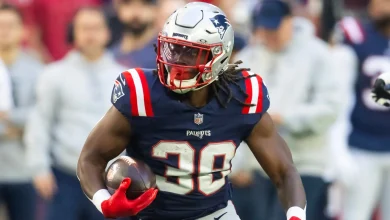
The familiarity of the pattern – the All Blacks drifting into a mental void after halftime in which they saw a 12-11 lead turn into a 25-12 deficit – tells the story of New Zealand’s season.
They are not yet an 80-minute team. Not even close.
They managed a solid first 40 at Twickenham where they moved the ball from set-piece better than they have all year and miraculously didn’t concede a single penalty.
It set them up to take control of the contest after the break – use their superior lineout to further drain England of confidence, amp up the power of a scrum that was starting to build dominance and keep their pass and catch sharp.
But, instead, the All Blacks fell apart.
Codie Taylor was yellow-carded for cynically playing the ball on the ground, the attack lost its shape and accuracy, and panic set in across the board.
Scott Robertson’s men struggled in the later stages of their defeat to England at Twickenham. Photo / Photosport
England were good enough to kill the wounded beast – composed and accurate, direct and confrontational in every aspect of their game – but they must have been a little surprised at how readily and quickly the All Blacks submitted to their fate.
England scored two good tries within a few minutes of each other, but the second just seemed too easy – Ollie Lawrence put a little bit of footwork on and then popped a short pass to his midfield partner Fraser Dingwall who cruised through a giant hole to touch down under the posts.
It was the symbolism of that score that almost mattered more.
It was a moment that demonstrated the frailties of this All Blacks team – a sign that the aura, if there is such a thing, is being dimmed by these iconic moments of weakness.
What must the sight of Twickenham, rising as one to celebrate Dingwall’s try in the near certainty that the game was in the bag with 20 minutes to go, have done for the value of brand All Blacks?
For years it has been the men in black who have come to the United Kingdom and conjured the big play, made the near-impossible look simple.
Even their most staunch enemies have admired the range and precision of their skill-sets.
But that doesn’t happen now. This All Blacks team may have a body of individuals who possess all they need to wow the world, but the ability to shape them into a cohesive entity with the ability to consistently deliver more than the sum of their collective parts remains aloof.
The All Blacks have developed this curious ability to play with enough promise to build hope, only to self-destruct in a whirr of compound errors.
Dingwall celebrating such a simple but decisive score conjured memories of South Africa running wild in Wellington earlier in the year.
It was a reminder of Argentinians madly celebrating their multiple turnovers in Buenos Aires, and even provoked a flashback to last week and Scotland’s relentless surge where a nation believed history was coming because the All Blacks were self-combusting.
And the symbolism has become impossible to ignore because it’s starting to feel like the All Blacks are not necessarily growing or learning the art of test rugby.
They are not on the same hopeful and upward trajectory of England, or South Africa. They are not building a similarly innovative attack game as Argentina are.
New Zealand are drifting. They don’t have bold leaders who can impose themselves on demand, and it was their most experienced cohort who fired the bullets into their own feet.
It was Taylor, a centurion, who couldn’t resist his impulse to slap the ball out of Marcus Smith’s hands.
It was Beauden Barrett who couldn’t find touch with a penalty; his brother Scott who was penalised – when New Zealand were still a chance of winning at 25-19 down – for jumping across at the lineout, while there was nothing much coming from the usually brilliant Ardie Savea.
No one in black had the calm head or heroic acts in their repertoire to shut England down and mount a last-quarter comeback, and there is an undeniable sense the All Blacks are falling behind their biggest rivals.
Last year, they scrapped out three tough wins against England, but now a gap has developed.
England had a group of leaders who stood up in the second half, made good decisions about where to play, had the accuracy of execution to exploit the small moments and, in George Ford, they had a playmaker who mixed things up with a brilliant blend of conservatism and adventure.
It’s not just the Grand Slam that has gone, so too is hope fading that this All Blacks team is going to mature and learn how to keep its head for 80 minutes.
Gregor Paul is one of New Zealand’s most respected rugby writers and columnists. He has won multiple awards for journalism and written several books about sport.




